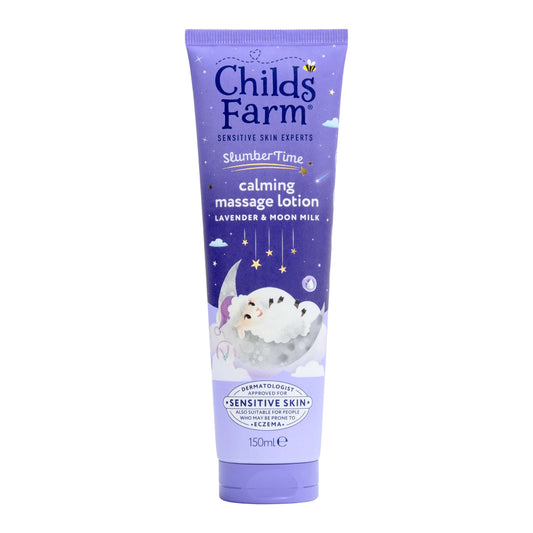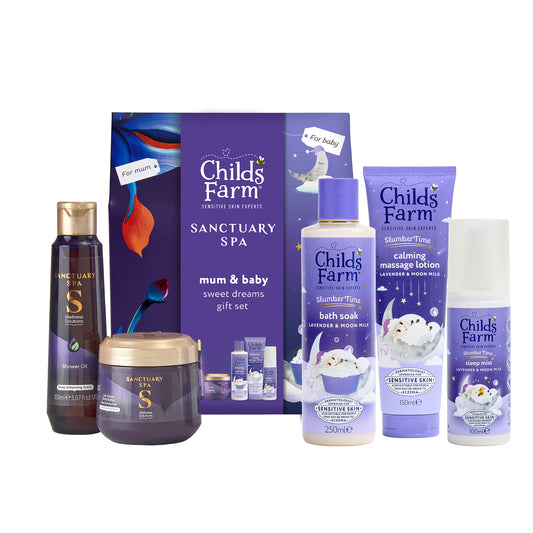As a new parent, you may be wondering how long do newborns sleep? It's normal to feel overwhelmed and exhausted from all the changes that come with having a baby. But understanding your little one’s sleep patterns can help make things easier for both of you.
In this article, we'll take a look at your questions about baby sleeping schedules and how to create a safe, peaceful environment. We'll also discuss tips on how to deal with your baby waking in the night. Finally, we’ll address the common challenges we all face when trying to develop healthy sleep habits for your little one. If you want to know how long newborns sleep, have a read of this.
- Newborn sleep patterns
- Creating the right sleeping environment
- Responding to night wakings
- Common sleep challenges in newborns
- 4 Tips for helping newborns get more restful sleep
- Childs Farms’ gentle & natural ingredients
- FAQs in relation to how long do newborns sleep?
Newborn sleep patterns
Newborns typically sleep for 16-18 hours over a 24-hour period, but the amount of sleep they get can vary depending on factors such as age, feeding schedule, and environment.
Average sleep times
Newborns generally need to be fed every two to three hours during the day and night. This means that their sleep is often broken up into shorter periods. As newborns grow older, they will usually start sleeping for longer stretches at night.
A baby typically sleeps for 15-16 broken into small chunks over 24-hours. Remember, every baby is different and your little one may need more or less sleep at any given time.
Factors affecting sleep
Several different factors can affect when your baby sleeps and how long for including hunger, temperature, noise levels in their environment, illness, or teething pain. It’s important to pay attention to your baby’s cues so you can adjust accordingly if needed.
For example, if your baby is waking more frequently due to hunger then you may want to lengthen their feeding time.
If it seems like too much noise is keeping them awake, then consider using a white noise machine. You could also play relaxing lullabies to drown out noise while they rest.
Signs of tiredness
Knowing when your baby is tired is key in helping them establish healthy sleeping habits from an early age. Some common signs include yawning, rubbing eyes/ears/face/head area, fussiness or crankiness and staring off into space (also known as “zoning out”). It’s good to pay attention to these cues so you know when it’s time for your little one to take a nap.
Establishing a routine can help babies feel secure because they know what comes next. This creates consistency during wakeful times as well as bedtimes and naptimes throughout the day.
Try giving your little one a warm bath and then read stories or sing lullabies before turning the lights out. This will help your baby understand that it’s time for sleep soon. Having a consistent wake-up time each morning also helps set expectations around how long night-time should last.
Getting enough sleep is important for newborns to grow and develop. Establishing a routine can help ensure your baby gets the rest they need, so let's look at how to do that next.
Key Takeaway
Newborns typically sleep for 16-18 hours over a 24-hour period. The amount of sleep they get can vary depending on factors such as age, feeding schedule and environment.
Establishing a routine is key to helping babies feel secure and setting expectations around how long night-time should last. Pay attention to signs of tiredness like yawning or fussiness so you know when it’s time for your little one to take a nap.
Creating the right sleeping environment
Creating a safe sleeping environment is essential for newborns to get the restful sleep they need.
To ensure your baby’s sleeping safely, check out the below guidelines and refer to the NHS advice.
- use a firm mattress that fits snuggly into the crib;
- remove any loose bedding or stuffed animals; and
- use a fitted sheet that is the right size for the mattress.
Temperature control is also important when creating a safe sleeping space for your baby. Make sure their room isn’t too hot or cold – aim for around 16-20 degrees Celsius. Dress them with one more layer than you would wear at that temperature.
Room lighting and noise levels should be kept low during nap times and night-time sleep. Keep curtains closed to block out sunlight, reduce background noise as much as possible, and keep nightlights dimmed so as not to disturb their sleep cycle.
Finally, provide some comfort items in your baby's sleeping area such as a favourite blanket or toy that can help them feel secure while they drift off. Just make sure these items are out of reach of the cot. This means they won’t become tangled up in sheets or blankets during sleep time.
Creating a safe sleeping environment is essential for your newborn's health and wellbeing. Let’s explore ways to help your newborn fall asleep more quickly and easily.
Responding to Night Wakings
Telling the difference between hunger and comfort needs
When your little one wakes at night, it can be difficult for you to tell if it’s because of hunger or comfort.
Newborn and young babies need a feeding every two to three hours at night. As your baby gets older, they will still need feeding during the night, but this will become less frequent.
Signs of hunger include fussing or crying as soon as you put them down in their cot or sucking on their hands or fingers. Signs of hunger can be when your baby is fussing or crying when they are put back in their cot after being fed.
Soothing baby back to sleep
Once you have determined whether your baby needs food or comforting, there are several ways you can use to help soothe them back to sleep. For example, try swaddling your baby tightly with a light blanket before laying them down in their cot. Doing this will help keep them warm while providing gentle pressure which can have a calming effect.
You could also play soft music near the cot (not directly into their ears) which can help them relax and drift off. Other soothing techniques such as rocking motions, rubbing backs/bellies gently, singing lullabies softly, etc., may also work. Your baby will tell you what he or she likes best.
Key Takeaway
When responding to night wakings, it can be difficult for parents to tell hunger and comfort needs apart.
There are several strategies you can use to help soothe them back to sleep.
Common sleep challenges in newborns
Colic and Reflux issues
Newborns can experience colic or reflux issues, which may cause difficulty sleeping. Signs of colic include if he or she cries for more than three hours a day, three days a week for at least three weeks. The crying is usually quite intense and occurs more or less at the same time each day.
Reflux occurs when stomach contents flow back up into the oesophagus, causing discomfort and distress. Reflux and colic are uncomfortable for your baby and will disrupt their sleep. You should talk to your doctor if your baby experiences these issues.
Teething pain
Teething pain can also disrupt sleep as it can be quite painful for your little one when a new tooth pushes through their gums. You know your baby is teething when your baby is drooling, is fussy or is actively biting on things. You can help relieve the pain with teething rings, by gently massaging a teething gel onto their gums, or by giving them something cold to suck on.
Sleep regressions
Sleep regressions occur when babies suddenly start waking up frequently throughout the night after previously sleeping well and for long periods. Sleep regressions usually go hand in hand with developmental milestones. Your baby's sleep patterns may change when they acquire a new skill, such as sitting up, crawling, or exploring.
But don’t worry, sleep regressions are not permanent so try to make the most of it. Sleep when your baby sleeps, and limit stimulation before bedtime to increase the chances of a restful night.
Sleep challenges in newborns are common, but with the right strategies and support from parents, these issues can be managed. Next up, we'll discuss how to create a sleep environment that encourages healthy sleep for your baby.
Key Takeaway
Newborns can experience difficulty sleeping due to colic, reflux and teething pain. Parents should establish a consistent bedtime routine that includes cuddling and soothing words before putting the baby down to sleep in their own space.
Additionally, limiting stimulation before bedtime by keeping lights dimmed low and noise levels quiet can help babies adjust to developmental milestones without disrupting their sleep too much.
4 Tips for helping newborns get more restful sleep
Swaddling can encourage sleep readiness
Swaddling is a great way to help newborns get more restful sleep. Swaddling helps babies feel secure and warm, which can make them feel calmer and more relaxed. It also prevents them from startling themselves awake with their own movements.
To swaddle correctly, wrap the baby in a lightweight blanket so that their arms are snuggly tucked against their body but not too tight. Make sure there is no loose fabric around the neck or face.
Incorporate skin-to-skin contact into your bedtime routine
Skin-to-skin contact can help newborns get more restful sleep. Skin-to-skin contact has been shown to reduce stress hormones in both parent and baby. It can also -
- improve bonding between parent and child
- regulate body temperature better than blankets alone
- promote breastfeeding success, and
- improve overall sleep quality for both mum and baby
When possible, try snuggling your little one close before bedtime for an extra dose of comfort!
White noise can help improve sleep rhythms
White noise can be used to create a calming environment for your newborn during naps or at night-time. White noise machines can help to drown out loud noises like dogs barking or people talking. You can buy white noise machines online or download an app for white noise without buying one.
Promote a healthy sleep schedule by feeding before bedtime
Newborn babies need to be fed regularly, every 2-3 hours. To help with night wakings in older babies and children, feeding 30 minutes before bedtime can prevent hunger pangs from waking them up prematurely.
By following these tips, parents can help their newborns get the restful sleep they need to grow and develop. Next up, we'll discuss how Childs Farms’ SlumberTime™ routine can help soothe and calm your baby before bedtime
Key Takeaway
Newborns need a comfortable and secure environment to get restful sleep. Swaddling, skin-to-skin contact, and white noise machines can all help create this calming atmosphere for your little one. With these tips you can ensure that your newborn is getting the best quality sleep possible!
Childs Farms’ gentle & natural ingredients
Sensitive skin is common in babies and children, so it is important to understand what it is and how to look after it effectively.
Sensitive skin is an uncomfortable feeling on the skin which can vary from person to person. It could be stinging, burning, itchiness, redness or tightness or a combination of these. These sensations can be triggered by many different factors: changing temperature, using cleansing products, and hormonal changes, often making it hard to control and predict what might cause sensitivity.
Childs Farm have chosen the best natural origin ingredients and lovingly bottled them up to care for your baby’s delicate skin. Using gentle products at bathtime that include ingredients such as grapeseed oil and shea butter are perfect to help soothe and moisturise skin, preparing for a restful night's sleep
Check out the SlumberTime™ three-step trio, here to calm the mind and soothe delicate skin for a night of sweet dreams.
FAQs in relation to how long do newborns sleep?
Can a newborn sleep too much?
No, newborns cannot sleep too much, providing they are regularly fed. Newborns typically sleep for 16-18 hours over a 24-hour period in the first few weeks of life. This is normal and necessary for their growth and development.
However, if your baby is sleeping more or not waking up to feed, it may be worth speaking to your doctor about it.
Is it normal for a newborn to sleep for 5 hours straight?
Newborns typically need frequent feeding and nappy changes throughout the day and night. They usually sleep in short intervals of 1-3 hours at a time, with some longer stretches of 4-5 hours during the night.
It is important to keep an eye on your baby's sleeping patterns as this can be an indication of their overall health and wellbeing.
How long do newborns sleep without feeding?
Newborns typically need to feed every 2-3 hours. During the first few weeks, newborns can sleep for up to 4-5 hours at a stretch without needing to be fed. However, it’s recommended that babies are fed very 2-3 hours to avoid dehydration.
After the first few weeks, babies should wake up every 3-4 hours for feeding even if they are sleeping longer stretches during the night. It is important that parents monitor their baby's eating habits to ensure they are getting enough nutrition throughout the day.
To wrap up
As parents, you can be left wondering how long do newborns sleep and what kind of environment is best for them. Creating a safe sleeping environment and responding to night wakings correctly can help your newborn get the rest they need.
Tips such as swaddling, skin-to-skin contact, and white noise can also be beneficial. Remember that every baby is different so it may take some trial and error to find out what works best for your little one.
Are you a new parent struggling to get your newborn enough sleep? Childs Farm has the perfect solution for you! Our naturally derived products are mild, kind, and gentle on skin and our delicious smelling fragrances and essential oils create the perfect products as part of your little one's bedtime routine.
With our products specifically designed for babies, we ensure safety and comfort in every bottle. Don't wait any longer – let us help give your newborn the peaceful slumber they need today!







